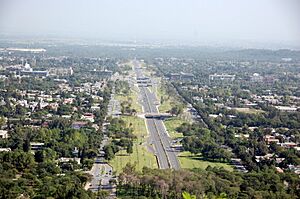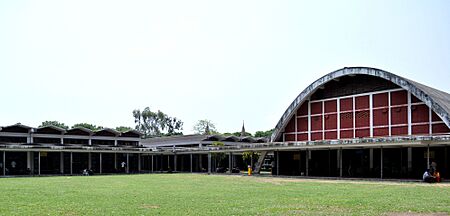Constantinos Apostolou Doxiadis facts for kids
Quick facts for kids
C. A. Doxiadis
|
|
|---|---|

Doxiadis teaching the principles of ekistics
|
|
| Born | 14 May 1913 Stanimaka, Kingdom of Bulgaria
|
| Died | 28 June 1975 (aged 62) Athens, Greece
|
| Nationality | Greek |
| Occupation |
|
| Children | Apostolos K. Doxiadis |
| Practice | Doxiadis Associates |
| Buildings | Teacher–Student Centre, University of Dhaka (Bangladesh) |
| Projects | Islamabad (Pakistan) |
Constantinos A. Doxiadis (born May 14, 1913 – died June 28, 1975), also known as C. A. Doxiadis, was a famous Greek architect and urban planner. He was known for designing cities and understanding how people live in them.
In the 1960s, he was the main architect and planner for Islamabad. This city was built to be the new capital of Pakistan. He also created a new field of study called "ekistics." This science looks at all parts of how humans live in settlements.
Contents
What Was Ekistics?
Doxiadis is known as the "father of ekistics." This word means the science of human settlements. It includes planning for regions, cities, communities, and even designing homes. Doxiadis first used the term in 1942.
He developed this idea because cities were growing very large and complex. Ekistics tries to understand all sizes of human living spaces. It also looks at how people lived in ancient cities and throughout history.
Doxiadis also came up with the word entopia. This word comes from Greek words meaning "in place." He believed that people don't need a "utopia" (a perfect but imaginary place). Instead, they need an "entopia." This is a real city that can be built. It's a place that makes dreamers happy and scientists agree with. It's where art and building come together.
How Did Doxiadis Influence the World?
In the 1960s and 1970s, Constantinos Doxiadis wrote many books and reports. These often discussed how big cities, like those around the Great Lakes in America, could grow. He was very popular in the 1960s.
He even spoke to the US Congress about the future of American cities. His picture was on the cover of Time magazine. His company, Doxiadis Associates, worked on big housing and city projects in over 40 countries. He also had a very advanced computer center for his time.
Every year, he held a meeting called the "Delos Symposium." Here, top thinkers and experts from around the world gathered to discuss ekistics.
However, in Greece, his home country, he faced some challenges. His ideas were often not used. He became very ill in his later years and could not speak for the last two years of his life. He passed away in 1975. After his death, his company changed owners. The Delos Symposium also stopped.
His work is still remembered. It has been shown in art museums and exhibitions.
Famous Projects and Works
One of his most famous city planning projects is Islamabad. This city was built from scratch. This meant his plans could be fully put into action. Many of his other ideas for older cities were harder to complete.
The plan for Islamabad keeps cars and people separate. It also makes public transport easy to use and affordable. The city can grow gradually without losing its human scale. This means it still feels like a community.
Doxiadis also worked on the Teacher-Student Centre (TSC), University of Dhaka in Bangladesh. This building was completed in 1961. He also helped plan the reconstruction of Skopje after a big earthquake in 1963.
Some of his other projects include:
- Sadr City in Baghdad, Iraq (1959)
- Master Plan for Islamabad, Pakistan (1960)
- Plan Doxiadis for Rio de Janeiro, Brazil (1965)
- Quaid-e-Azam Campus, University of the Punjab, Lahore, Pakistan (1973)
He even took part in the architecture event at the 1936 Summer Olympics art competition.
Awards and Honors
Constantinos Doxiadis received many awards for his work:
- Greek War Cross (1941) – for his service during the war.
- Order of the British Empire (1945) – for his work in the Greek Resistance and with Allied Forces.
- Order of the Cedar of Lebanon (1958) – for helping Lebanon develop.
- Order of the Phoenix (1960) – for his help in developing Greece.
- Sir Patrick Abercrombie Prize (1963) – from the International Union of Architects.
- Cali de Oro (Mexican Gold Medal) Award (1963) – from the Society of Mexican Architects.
- Award of Excellence (1965) – from the Industrial Designers Society of America.
- Aspen Award for the Humanities (1966).
- Order of the Yugoslav Flag with Golden Wreath (1966).
See also
 In Spanish: Konstantínos Doxiádis para niños
In Spanish: Konstantínos Doxiádis para niños
- Apostolos Doxiadis
- Settlement hierarchy
 | Delilah Pierce |
 | Gordon Parks |
 | Augusta Savage |
 | Charles Ethan Porter |



